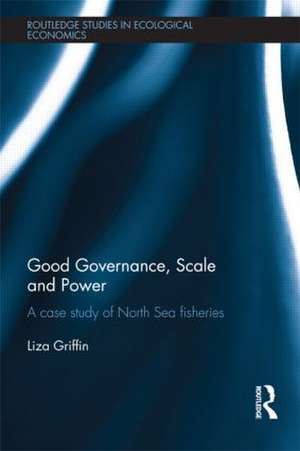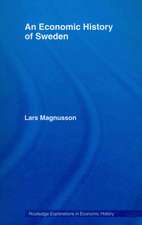Good Governance, Scale and Power: A Case Study of North Sea Fisheries: Routledge Studies in Ecological Economics
Autor Liza Griffinen Limba Engleză Paperback – 4 mar 2015
This book examines the discourse and practice of ‘good governance’ in the context of fisheries management. It starts by examining the ‘crisis’ of fisheries in the North Sea, caused primarily by overfishing and failure of the European Union’s Common Fisheries Policy. It then goes on to analyse reforms to this policy enacted and planned between 2002 and 2013, and the proposition that collapse of fish stocks could occur as a result of deficiencies in new governing arrangements, i.e. failure to apply ‘principles of good governance’. The book argues that impediments to good governance practice in fisheries are not merely the result of implementation deficits, but that they constitute a more systematic failure. Governance theory addresses issues of power, but it does not recognise the many important spatially contingent and relational forms of power that are exercised in actual governing practice. For example, it frequently overlooks spatial practices and strategies, such as ‘scale jumping, ‘rescaling’ and the discursive redrawing of governing boundaries. This book exposes some of these spatial power relationships, showing that the presence of such relationships has implications for accountability and effective policymaking.
In sum, this book explores some of the ways in which we might better understand governance practice using theories of scale and relational concepts of power, and in the process it offers a critique and rethinking of governance theory. These reflections are made on the basis of an in-depth case study of the attempted pursuit of ‘good governance’ in the European Union via institutional reforms, focusing particularly on the thorny and fascinating case of North Sea fisheries management.
| Toate formatele și edițiile | Preț | Express |
|---|---|---|
| Paperback (1) | 423.89 lei 6-8 săpt. | |
| Taylor & Francis – 4 mar 2015 | 423.89 lei 6-8 săpt. | |
| Hardback (1) | 1059.84 lei 6-8 săpt. | |
| Taylor & Francis – 24 ian 2013 | 1059.84 lei 6-8 săpt. |
Din seria Routledge Studies in Ecological Economics
-
 Preț: 311.41 lei
Preț: 311.41 lei -
 Preț: 151.85 lei
Preț: 151.85 lei -
 Preț: 310.31 lei
Preț: 310.31 lei - 26%
 Preț: 819.09 lei
Preț: 819.09 lei - 25%
 Preț: 851.99 lei
Preț: 851.99 lei -
 Preț: 412.70 lei
Preț: 412.70 lei -
 Preț: 487.75 lei
Preț: 487.75 lei - 18%
 Preț: 1167.58 lei
Preț: 1167.58 lei -
 Preț: 397.54 lei
Preț: 397.54 lei -
 Preț: 482.53 lei
Preț: 482.53 lei -
 Preț: 484.47 lei
Preț: 484.47 lei - 26%
 Preț: 987.21 lei
Preț: 987.21 lei -
 Preț: 411.42 lei
Preț: 411.42 lei -
 Preț: 421.02 lei
Preț: 421.02 lei - 12%
 Preț: 341.66 lei
Preț: 341.66 lei - 11%
 Preț: 336.99 lei
Preț: 336.99 lei - 18%
 Preț: 1167.36 lei
Preț: 1167.36 lei -
 Preț: 485.75 lei
Preț: 485.75 lei - 13%
 Preț: 295.07 lei
Preț: 295.07 lei -
 Preț: 486.17 lei
Preț: 486.17 lei -
 Preț: 429.25 lei
Preț: 429.25 lei - 13%
 Preț: 296.68 lei
Preț: 296.68 lei - 18%
 Preț: 1171.54 lei
Preț: 1171.54 lei - 16%
 Preț: 248.15 lei
Preț: 248.15 lei - 18%
 Preț: 1057.75 lei
Preț: 1057.75 lei - 25%
 Preț: 823.44 lei
Preț: 823.44 lei -
 Preț: 492.16 lei
Preț: 492.16 lei - 18%
 Preț: 1064.19 lei
Preț: 1064.19 lei -
 Preț: 413.13 lei
Preț: 413.13 lei - 18%
 Preț: 1168.37 lei
Preț: 1168.37 lei - 15%
 Preț: 421.44 lei
Preț: 421.44 lei - 18%
 Preț: 1058.79 lei
Preț: 1058.79 lei - 18%
 Preț: 1057.75 lei
Preț: 1057.75 lei - 18%
 Preț: 1162.84 lei
Preț: 1162.84 lei - 18%
 Preț: 1171.89 lei
Preț: 1171.89 lei - 26%
 Preț: 822.54 lei
Preț: 822.54 lei
Preț: 423.89 lei
Preț vechi: 498.69 lei
-15% Nou
Puncte Express: 636
Preț estimativ în valută:
81.12€ • 84.18$ • 67.80£
81.12€ • 84.18$ • 67.80£
Carte tipărită la comandă
Livrare economică 15-29 martie
Preluare comenzi: 021 569.72.76
Specificații
ISBN-13: 9781138904927
ISBN-10: 1138904929
Pagini: 240
Ilustrații: 14 black & white illustrations, 4 black & white tables, 7 black & white halftones, 7 black & white line drawings
Dimensiuni: 156 x 234 mm
Greutate: 0.36 kg
Ediția:1
Editura: Taylor & Francis
Colecția Routledge
Seria Routledge Studies in Ecological Economics
Locul publicării:Oxford, United Kingdom
ISBN-10: 1138904929
Pagini: 240
Ilustrații: 14 black & white illustrations, 4 black & white tables, 7 black & white halftones, 7 black & white line drawings
Dimensiuni: 156 x 234 mm
Greutate: 0.36 kg
Ediția:1
Editura: Taylor & Francis
Colecția Routledge
Seria Routledge Studies in Ecological Economics
Locul publicării:Oxford, United Kingdom
Public țintă
Postgraduate and UndergraduateCuprins
1. Introduction: Plenty more fish in the sea? 2. The North Sea Crisis, the Common Fisheries Policy and its Reforms 3. Fisheries and the Principles of Good Governance: The tensions and contradictions 4. Fisheries and the Principles of Good Governance: Tensions and contradictions in the search for effectiveness and coherence 5. All aboard: Fisheries stakeholders, governance and power – Redrawing the boundaries of participation 6. Fish Scales: Rescaling and performing scale in the North Sea region 7. Red Herrings and Discourses of Scale in the North Sea 8. Reflections, Theorisations and Conclusions
Notă biografică
Liza Griffin is Lecturer in Environment and Sustainable Development at University College London, UK.
Descriere
This book explores some of the ways in which we might better understand governance practice using theories of scale and relational concepts of power, and in the process it offers a critique and rethinking of governance theory. These reflections are made on the basis of an in-depth case study of the attempted pursuit of ‘good governance’ in the European Union via institutional reforms, focusing particularly on the thorny and fascinating case of North Sea fisheries management.





















